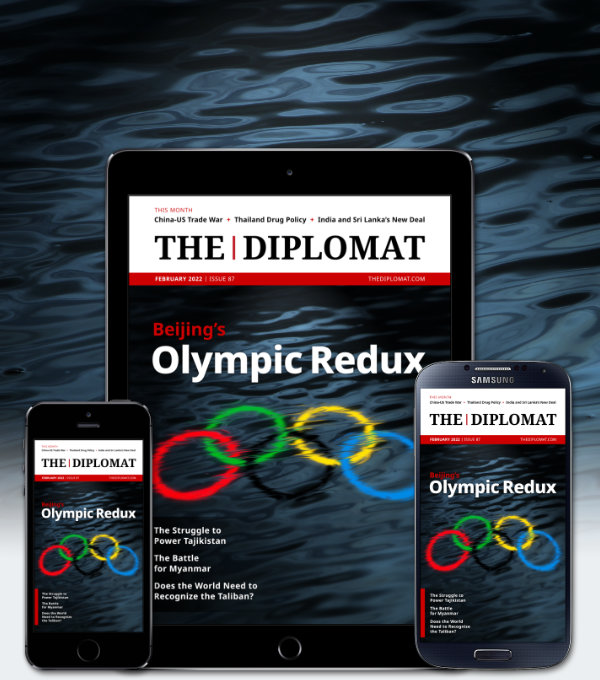| Welcome to the latest issue of Diplomat Brief. This week our top story explores the Myanmar military’s messaging, which continues to appeal to many in the country even a year after the coup and ensuing crackdown. We also have an interview with Chandran Nair, founder of the Global Institute for Tomorrow, on the role of White privilege in international relations. |
| Story of the week |  | SECURITY Myanmar’s Military MindsetWhat Happened: On February 1, 2021, Myanmar’s military seized power from the elected government of Aung San Suu Kyi. Since then, the generals have faced widespread resistance – first peaceful protests, then armed resistance from the self-designated People’s Defense Force. Understanding the military’s determination to hold onto power requires a deeper look at the Tatmadaw’s self-conception and how it continues, even now, to attract supporters. Our Focus: For decades, Myanmar’s military has held itself up as the unquestionable defender of the country. “The officers self-perceive themselves as superior, better and smarter than any civilian, and as the members of the only patriotic national organization,” Dr. Maung Zarni, a pro-democracy activist who grew up in a military family, told The Diplomat. Soldiers see themselves as “virtuous defenders of the country, of the race and of the Buddhism… They truly believe that the military is above civil society and must be above any democratic control.” These ideas continue to resonate with many, despite growing disillusionment following the coup. What Comes Next: This ideology is coming under assault, however. A key difference between the current generation of pro-democracy fighters and previous iterations – including the 8/8/88 generation – is the new emphasis on joining hands with ethnic groups and remaking Myanmar as a truly multiethnic country. Many of today’s youth reject Myanmar’s military as well as its heavy emphasis on protecting the majority Bamar ethnic group. Young activist Thinzar Shunlei Yi told The Diplomat that “being raised with independence movement films and songs turned many into strong nationalists with irrational, self-constructed notions on race, religion, and ethnicity.” She argues, “Democracy embraces diversity and manages to flourish out of it – the Tatmadaw simply isn’t designed to lead this path.” Read this story |
| Behind the News | INTERVIEW Chandran NairChandran Nair, founder of the Global Institute for Tomorrow and author of “Dismantling Global White Privilege,” on calls to boycott the Beijing Olympics: “In the 21st century, with all the grand posturing about social progress, inclusion and diversity, it is high time the West understands the Olympics is for the whole world, not just for the West. The opinions of Western countries should not carry more weight in an international body than the combined opinion of over a hundred others, the global majority.” Read the interview |
| This Week in Asia | Northeast Asia Beijing Olympics Kick OffThe Beijing 2022 Winter Olympics will officially open on Friday, and there’s more than just medals at stake. China is hoping to welcome thousands of visitors from overseas – including some two dozen foreign leaders – without jeopardizing its zero-COVID policy. The oddities of the “Olympic bubble” will make this a bizarre Games for athletes and spectators alike. Meanwhile, highly publicized diplomatic boycotts and demands for athletes to speak out over human rights issues will put politics front and center at these Olympics – even more than usual. Find out more | South Asia Can Afghanistan Get Rich Off Its Resources?It’s no secret that Afghanistan’s economy is in crisis, as the Taliban struggle to cope with asset freezes abroad and unemployment domestically – including women forced out of the workplace by the Taliban themselves. The Taliban, like many others, see exploiting mineral riches as a way to jumpstart economic growth, but interviews on the ground reveal many obstacles to making Afghanistan’s mining dreams come true. Meanwhile, international officials say direct aid is the only solution in the short term to prevent widespread deaths from hunger and cold in Afghanistan. Find out more | Southeast Asia Bali Fully Reopens to Foreign TouristsOn Friday, the Indonesian island of Bali will reopen to all foreign travelers after two years of COVID-19-induced disruptions. The popular tourism destination technically opened to visitors from select countries in October, but no airlines established direct international flights and tourist numbers remained stagnant. Despite visitors having to serve a five-day quarantine, Bali’s full reopening will undoubtedly come as welcome news for many inhabitants of an island that derives 54 percent of its economy from tourism. With similar openings underway in other parts of the region, it could mark the beginning of the end for Southeast Asia’s great tourism recession. Find out more | Central Asia Central Asia’s Leaders Head to ChinaFresh off a virtual summit with Chinese President Xi Jinping, all five Central Asian presidents are slated to join the Olympic festivities in Beijing at the end of this week. It’s not for love of winter sports: only Kazakhstan and Uzbekistan have ever won medals at the Winter Olympics, and Turkmenistan and Tajikistan aren’t even sending athletes to Beijing. Instead, Central Asia’s presidents are eager to seize a rare chance to rub elbows in person with Xi. Find out more |
| Visualizing APAC |  | 25 countries are sending leaders to the Opening Ceremony of the Beijing Olympics, with Central Asia and the Middle East especially well represented. See the full picture |
| Word of the Week | MAGAZINE Маҳдудияти таъмини барқMahdudijati tamini barq: Tajik for “electricity limit,” a phrase used to refer to annual electricity rationing – scheduled but unannounced blackouts that usually last from early October well into winter. Find out more |
| Webinar | The Diplomat Asks Cambodia as ASEAN Chair: What to ExpectCambodia currently holds the rotating chair position of the Association of Southeast Asian Nations (ASEAN). Its last stint as ASEAN chair, in 2012, was surrounded by controversy, as Phnom Penh blocked ASEAN’s consensus statement on the South China Sea disputes, reportedly at China's behest. How will Cambodia approach its role as chair in 2022? What should we expect in terms of its positioning on flashpoints like the crisis in Myanmar and the long-simmering South China Sea disputes? And what, exactly, is the role of China in Cambodia's diplomatic decision making? If you missed the live webinar discussing these issues, you can now view the recording. Watch the webinar |
|  |




